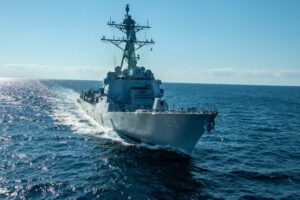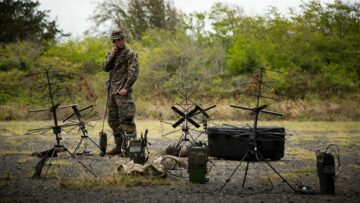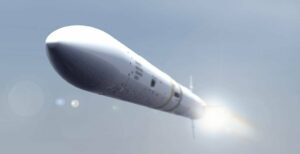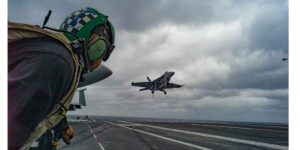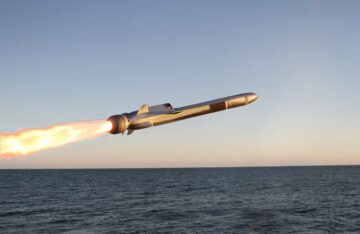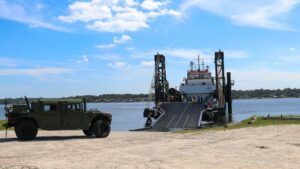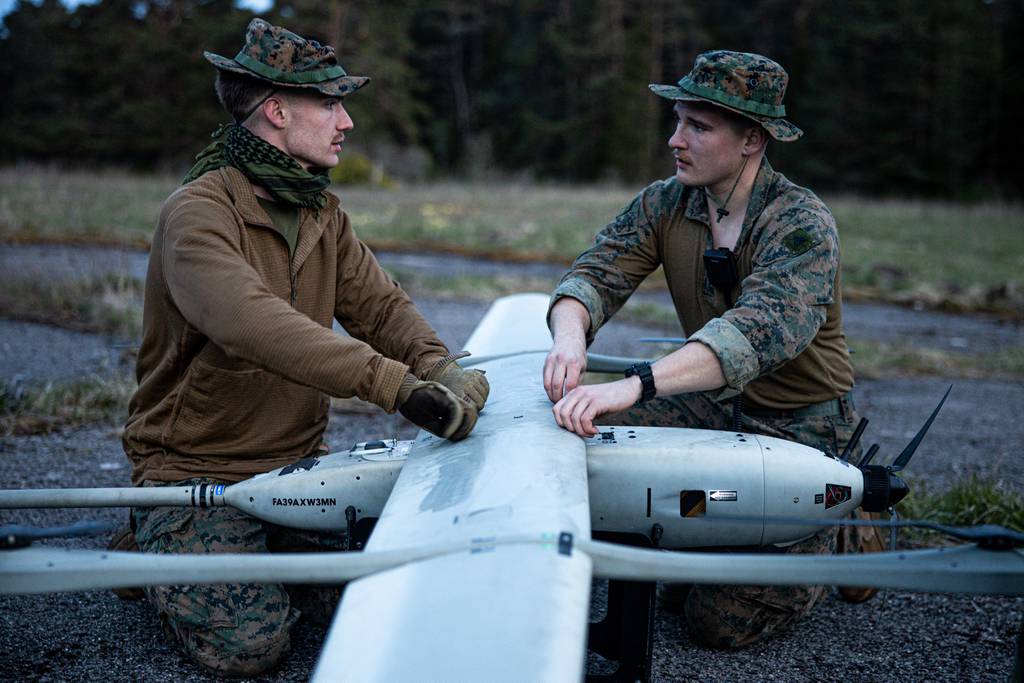
LONDON — Artificial intelligence and autonomy companies from Australia, the United Kingdom and the United States are already feverishly developing and pitching tools to gather ever-more data and then help operators make sense of an information-overload environment.
They’re hoping all this work will lead to contracts at home and with the allies soon, as more details about the second phase of the AUKUS trilateral arrangement, focused on advanced technology, come to light this fall.
Little has been formally revealed about the effort. The AUKUS collaboration was announced in September 2021, and in March 2023 the three nations’ top leaders gathered in California to reveal plans for the Pillar 1 that’s focused on nuclear-powered submarines — first involving U.K. and U.S. vessels operating from an Australian base, then Australia buying American submarines as an interim solution, and then the nations collaborating on an AUKUS-specific attack submarine for the U.K. and Australia to each build and operate.
Pillar 2 will cover critical technologies: artificial intelligence, quantum computing, hypersonics, autonomy and more, it is believed.
U.S. Undersecretary of Defense for Research and Engineering Heidi Shyu told reporters last month she expected President Joe Biden to announce more details this fall.
AI developers, though, are confident they’ll benefit from whatever the final plan ends up being.
“We view ourselves — even though we’re a British company, we’re an allies-first company, as we call it. So we see the AUKUS opportunity really being the ability for us to deploy what we see as a critical, strategically fundamental capability not only to the U.K. but to our allies,” Adarga CEO Rob Bassett Cross told Defense News during the company’s demonstration of its Vantage AI-based decision-making tool at the DSEI 2023 defense expo in London.
Even without final Pillar 2 details, one Australian company is already seeing benefits as it tries to secure domestic sales.
Michael Partridge, the general manager of Australian drone-builder SYPAQ, told Defense News that his government was already in the midst of evolving its approach to helping small businesses not only develop new technologies but get them into the hands of warfighters for experimentation and on contract with acquisition officials, as part of its recent Defence Strategic Review. The looming AUKUS Pillar 2 arrangement has further aided SYPAQ’s effort to have serious talks about doing business with the government.
“The conversations are markedly different,” he said. “What we’re seeing is government agencies aligning to the AUKUS pillar objectives, and that in itself just changes the narrative a little bit. So we’re starting to have conversations about common outcomes between different government agencies based off the objectives of AUKUS.”
Rather than trying to sell a new technology in a bubble, without any context, “if you can align yourself with the objectives of those AUKUS pillars, it tends to line up the conversations between different government agencies. We’re finding — it’s only the first year or two into it — but it’s definitely having a massive influence into the way that people are perceiving how they would deliver the technologies.”
What industrial bases are doing
AUKUS is expected to bring some legislative and policy changes that make sharing technology innovations and selling systems between the three countries much easier.
Though that’s yet to happen, some companies are already gravitating towards partnerships with other AUKUS nations’ industrial bases.
Sentient Vision Systems, for example.
The Australian company developed the ViDAR sensor, a visual detection and ranging sensor meant to complement radar by conducting an optical search of an area and using artificial intelligence to help identify items of interest: small boats or even people in the water, moving vehicles or people on land, and so on.
Though unaffiliated with AUKUS, Sentient Vision Systems Business Development Director Paul Harris said the company already found itself linked closely with American and British organizations in an effort to develop a ViDAR payload for the Stalker drone, a group 2 small unmanned aerial system.
In 2021, Sentient Vision participated in a foreign comparative testing event with the U.S. Marine Corps, where the Marines favorably evaluated the ViDAR payload on the Stalker drone.
Now, Sentient Vision is in close talks with Edge Autonomy — the original equipment manufacturer of the Stalker drone — about further refining the small ViDAR payload and making it part of the sales pitch for Stalker drones in Europe and around the world.
Harris said Sentient Vision was also in talks with American company Shield AI to develop a ViDAR payload for its V-BAT drone, as well as improve the ViDAR’s performance with the integration of Shield AI’s Hivemind AI technology.
“It’s going to be a really interesting journey ahead. Firstly, from an AUKUS perspective, we all come from countries with a similar value set. We’ve all got similar operational challenges. And the Australian Defence Force and U.S. DoD work hand in glove in the Indo-Pacific, in particular,” Harris said.
Not only do the navies operate together in the Pacific, the Australian Army and U.S. Marine Corps have been tightly knit as the Aussies establish an amphibious warfare capability of their own.
Harris said this “natural comradery at a national level” will certainly open doors — but so, too, will AUKUS-related policy changes, such as one the U.S. Congress is considering that would allow Australian and British technology to be considered domestically sourced, something that only Canada qualifies for today.
These legislative changes “will enable it to be easier for Australian companies to do business more readily in the US. I think the U.S. is very receptive of partnership with Australia, and AUKUS only amplifies that favorable environment,” Harris said.
Adarga, too, is already eyeing business through AUKUS. Cross said his company already has a small team in the U.S. and is setting up a small office in Australia now.
AUKUS promises a tighter operational tie between the three nations, and specifically their navies, as they operate in the Pacific to keep the peace and to deter Chinese aggression.
Cross said Vantage was a must-have tool for allies going forward. Unsaid was that the tool would be able to pull from three different data sets to create even better outcomes, if the nations can get their information-sharing agreements right under AUKUS.
Vantage is an AI-powered decision aid. Cross is a military veteran who said that, during his deployments, “we were often acting without the insights we needed. It wasn’t we lacked the data, even back then; we had a vast amount of it,” Cross said. “We just didn’t have the time or the tools needed to make sense of it all. We had all the pieces of the jigsaw, if you will, but were rarely able to fit them all together in time to get a clear and dynamic understanding of our operating environment.”
Vantage, which has already been offered to Adarga’s existing military, government and commercial customers and is, as of this week, available to a wider customer base, constantly takes in both in-house and open-source documents of all kinds and formats to build its information base.
The system can then be queried for a report: “from the increasing Russian influence in Mali, what is the threat to the stability of the region?,” product manager Ollie Carmichael offered as an example during the Sept. 13 demonstration at DSEI.
Q&A feature
He showed how Vantage first showed a list of people and organizations of interest to this topic, all of which could be further investigated, and then a visual representation of how people, events and locations were all connected, as it relates to the issue of Russian influence in Mali.
Carmichael also showed a question-and-answer feature for more specific questions, where a user may need a fact that buried in an old report that’s not easily accessible, but that Vantage can find and report back in minutes.
“Whatever your role, the challenge is the same: information is scattered across silos, on different systems, and within inaccessible sources,” he said.
Cross said the U.K.’s three services and the Strategic Command all use its AI tools, as do commercial customers who need to know more about non-financial risks to their business and how events and geopolitical factors could affect them.
He said he hopes to expand the customer base soon.
“We’ve been talking about this for some time. The technology’s now here,” he said, and he’s ready to sell to American and Australian buyers.
Megan Eckstein is the naval warfare reporter at Defense News. She has covered military news since 2009, with a focus on U.S. Navy and Marine Corps operations, acquisition programs and budgets. She has reported from four geographic fleets and is happiest when she’s filing stories from a ship. Megan is a University of Maryland alumna.
- SEO Powered Content & PR Distribution. Get Amplified Today.
- PlatoData.Network Vertical Generative Ai. Empower Yourself. Access Here.
- PlatoAiStream. Web3 Intelligence. Knowledge Amplified. Access Here.
- PlatoESG. Automotive / EVs, Carbon, CleanTech, Energy, Environment, Solar, Waste Management. Access Here.
- PlatoHealth. Biotech and Clinical Trials Intelligence. Access Here.
- ChartPrime. Elevate your Trading Game with ChartPrime. Access Here.
- BlockOffsets. Modernizing Environmental Offset Ownership. Access Here.
- Source: https://www.defensenews.com/battlefield-tech/2023/09/14/australian-uk-and-us-tech-companies-already-reaping-aukus-benefits/
- :has
- :is
- :not
- :where
- $UP
- 1
- 11
- 13
- 2021
- 2023
- 70
- a
- ability
- Able
- About
- accessible
- acquisition
- across
- acting
- advanced
- Advanced Technology
- affect
- agencies
- agreements
- ahead
- AI
- AI-powered
- Aid
- align
- aligning
- All
- allow
- already
- also
- American
- amount
- amplifies
- an
- and
- Announce
- announced
- any
- approach
- ARE
- AREA
- Army
- around
- arrangement
- artificial
- artificial intelligence
- AS
- At
- attack
- Aussies
- Australia
- Australian
- Australian company
- available
- back
- base
- based
- BE
- been
- being
- believed
- benefit
- benefits
- Better
- between
- biden
- Bit
- both
- bring
- British
- bubble
- Budgets
- build
- business
- business development
- businesses
- but
- buyers
- Buying
- by
- california
- call
- CAN
- Can Get
- Canada
- capability
- ceo
- certainly
- challenge
- challenges
- Changes
- chinese
- clear
- Close
- closely
- collaborating
- collaboration
- come
- commercial
- Common
- Companies
- company
- Company’s
- Complement
- computing
- conducting
- confident
- Congress
- connected
- considered
- considering
- constantly
- context
- contract
- contracts
- conversations
- could
- countries
- cover
- covered
- create
- critical
- Cross
- customer
- customer base
- Customers
- data
- data sets
- decision
- Decision Making
- defence
- Defense
- definitely
- deliver
- deploy
- deployments
- details
- Detection
- develop
- developed
- developers
- developing
- Development
- different
- Director
- do
- documents
- DoD
- doing
- Domestic
- domestically
- doors
- drone
- Drones
- during
- dynamic
- each
- easier
- easily
- Edge
- effort
- enable
- ends
- Engineering
- Environment
- equipment
- establish
- Europe
- evaluated
- Even
- Event
- events
- evolving
- example
- existing
- Expand
- expected
- Expo
- Face
- fact
- factors
- Fall
- favorable
- Feature
- Filing
- final
- Find
- finding
- First
- fit
- Focus
- focused
- For
- Force
- foreign
- Formally
- Forward
- found
- four
- from
- fundamental
- further
- Gain
- gather
- gathered
- General
- geographic
- geopolitical
- get
- going
- got
- Government
- government agencies
- Group
- had
- hand
- Hands
- Have
- having
- he
- help
- helping
- here
- his
- Home
- hopes
- hoping
- How
- HTTPS
- i
- identify
- if
- image
- images
- improve
- in
- inaccessible
- increasing
- industrial
- influence
- information
- innovations
- insight
- insights
- integration
- Intelligence
- interest
- interesting
- interim
- into
- involving
- issue
- IT
- items
- ITS
- itself
- jigsaw
- joe
- Joe Biden
- journey
- jpg
- just
- Keep
- Kingdom
- knit
- Know
- Land
- Last
- lead
- leaders
- Legislative
- light
- Line
- linked
- List
- little
- locations
- London
- looming
- make
- Making
- manager
- Manufacturer
- March
- Marine
- Martin
- Maryland
- massive
- May..
- meant
- Megan
- Military
- millions
- minutes
- more
- moving
- much
- Must-Have
- NARRATIVE
- National
- Nations
- Need
- needed
- New
- New technologies
- news
- now
- objectives
- of
- off
- offered
- Office
- officials
- often
- Old
- on
- ONE
- only
- open
- open source
- operate
- operating
- operational
- Operations
- operators
- Opportunity
- or
- organizations
- original
- Other
- our
- ourselves
- outcomes
- own
- Pacific
- part
- participated
- particular
- Partnership
- partnerships
- Paul
- peace
- People
- performance
- perspective
- phase
- photo
- pieces
- Pillar
- pillars
- Pitch
- pitching
- plan
- plans
- plato
- Plato Data Intelligence
- PlatoData
- policy
- president
- president joe biden
- problems
- Product
- product manager
- Programs
- promises
- Quantum
- quantum computing
- Questions
- quickly
- radar
- ranging
- rarely
- readily
- ready
- really
- reaping
- recent
- refining
- region
- report
- Reported
- reporter
- representation
- research
- reveal
- Revealed
- review
- right
- risks
- rob
- Role
- russian
- s
- Said
- sales
- same
- scattered
- Search
- Second
- secure
- see
- seeing
- sell
- Selling
- sense
- sept
- September
- serious
- Services
- set
- Sets
- setting
- sharing
- she
- Shield
- showed
- Sift
- silos
- similar
- since
- small
- small businesses
- So
- solution
- some
- something
- Soon
- sourced
- Sources
- specific
- specifically
- Stability
- Starting
- States
- Stories
- Strategic
- strategic review
- Strategically
- such
- system
- Systems
- takes
- talking
- Talks
- team
- tech
- tech companies
- Technologies
- Technology
- Technology Innovations
- tends
- Testing
- than
- that
- The
- the United Kingdom
- the world
- their
- Them
- then
- they
- think
- this
- this week
- those
- though?
- threat
- three
- Through
- TIE
- tighter
- tightly
- time
- to
- today
- together
- told
- too
- tool
- tools
- top
- topic
- towards
- trying
- two
- U.K.
- u.s.
- u.s. congress
- U.S. Navy
- UAV
- Uk
- under
- understanding
- United
- United Kingdom
- United States
- university
- University of Maryland
- us
- use
- User
- users
- using
- value
- variety
- Vast
- Vehicles
- very
- vessels
- veteran
- View
- vision
- vision systems
- was
- Water
- Way..
- we
- week
- WELL
- were
- What
- What is
- whatever
- when
- which
- WHO
- wider
- will
- with
- within
- without
- Work
- world
- would
- year
- yet
- you
- Your
- yourself
- zephyrnet

